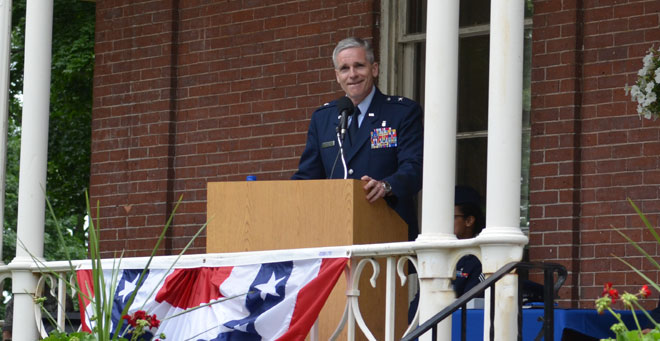 |
|
|
Sean Collins, PhD, at his promotion to Brigadier General in the United States Air Force, Air National Guard. |
A PhD-trained health researcher with more than 30 years in nursing and 20 years in the military, Sean Collins, PhD, assistant professor of nursing and an alum of the Graduate School of Nursing, holds one of the most competitive perches in the United States military’s medical infrastructure. His education and experience in clinical care, education, research and military service have culminated in the rank of Brigadier General in the United States Air Force, Air National Guard.
“Serving in the uniform is an honor and a privilege. My life experiences and education have offered me an opportunity to serve my fellow members in a competent and compassionate way,” said Brig. Gen. Collins. “In turn, my military service has given me insights that I use in the classroom and clinical setting.”
The Southwick native and member of the Air National Guard's 104th Fighter Wing Medical Group based in Westfield, Mass., since 1995, is serving a three-year tour as the assistant for mobilization and reserve affairs in the Office of the Assistant Secretary of Defense for Health Affairs at the United States Defense Health Agency. In this role, he is a principal advisor on health care policy and practice for the nation’s military reserve component, whose more than one million members comprise both the National Guard and Reserves. The Defense Health Agency is a joint, integrated combat support agency that enables the Army, Navy, Marines and Air Force to provide a healthy combat force and well-prepared medical professionals to care for active service members in both peacetime and wartime.
“The big thing the military complex is focusing on now is readiness. The concern is that people will lose skills perfected during times of war as Iraq and Afghanistan wind down,” said Collins. “Our job at DHA is to deliver to combat commanders a medically ready fighting force and a medically ready provider force. This training is critical and we have made major progress into making sure we sustain these skills.”
After his first overseas deployment as a nurse practitioner and medical team leader in the Kosovo crisis, Collins was ready to take his academic training to the next level with a PhD in nursing. Fatefully, the first day of class for the doctoral program was Sept. 11, 2001; he was called immediately to active duty and would not defend his doctoral dissertation and graduate until 2009.
With his academic plans temporarily on hold, Collins completed several deployments with his Air National Guard unit at home and in the Middle East. Sent to Iraq in 2004, he worked side by side with health care providers from around the world in the emergency room of the Air Force Hospital, caring for local residents, contractors and members of all branches of the armed services. During his 2008 Iraq deployment, he saw heavy combat casualties. Tapped for his doctoral training as a senior researcher for the Joint Combat Casualty Research Team, his final deployment to Helmand Province in Afghanistan in 2011 was also amid heavy fighting with catastrophic injuries.
“Working side by side with all branches of the military in an active combat zone is truly awe-inspiring,” he said. “We were doing research looking at lifesaving interventions we were doing for our wounded in theater. A lot of that research proved critical to how we take care of patients today.”
Data gleaned over 15 years of battle experience in Iraq and Afghanistan demonstrates that if frontline military medical personnel can get the wounded to the hospital alive, more than 90 percent of them will live to tell their story. “Ninety to 95 percent of the wounded who arrive in a trauma room survive, and you’re talking people with catastrophic injuries like triple amputations, that survive based on the trauma care we provide now,” Collins said.
New standards of care include tourniquet use, which when done properly is an essential survival tool, as evidenced during the Boston Marathon. Walking blood banks in war zones with lack of refrigeration can now take blood from a healthy soldier’s arm and deliver it to the patient on the operating room table within 45 minutes.
Collins’ doctoral dissertation identified physical and mental disorders faced by service members after deployment. The largest study of its kind undertaken to date surveyed more than 500,000 service members representing all components and branches of the military. Of the total sample, 51.9 percent saw wounded, killed or dead individuals and 22.1 percent discharged their weapon in combat. Environmental exposures were an important source of stress. Forty percent of the sample reported four or more symptoms such as diarrhea, back pain, headache and fatigue. PTSD symptoms were identified in 11.8 percent and depressive symptoms in 26.5 percent of participants. These findings have implications for practice, policy and future research into military health care needs and delivery.
In addition to teaching courses and lecturing at the Graduate School of Nursing and School of Medicine and fulfilling his military duties, Collins provides direct patient care as a nurse practitioner in the Diabetes Center of Excellence at UMass Memorial Medical Center.
While Collins has temporarily cut back his teaching and clinical responsibilities to serve at the Defense Health Agency in Washington, D.C., he will ramp both back up at the end of his tour, continuing to study post-deployment health, veterans health and care for chronic illnesses, including diabetes, hypertension, and kidney disease, which he sees daily in his clinical practice.
Going forward, his work will be informed by new skills and knowledge gained at the Pentagon. “It goes back to the whole reason why I serve,” Collins explained. “I never give up a skill set or an opportunity so I always say yes.”
Related stories on UMassMedNow:
Medical, nursing students learn about veterans unique health care needs
Collaboration announced to help prevent military suicide